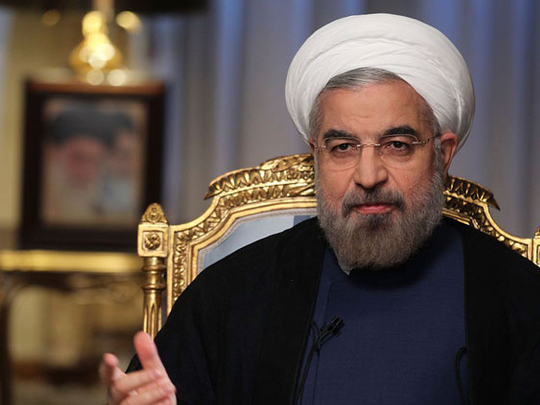
New York: Away from the glare of the nuclear talks between Iran and world powers, President Hassan Rouhani has endured a series of setbacks and retreats on his domestic agenda.
Last week, Rouhani lost a key foreign policy adviser, for the offence of wearing a tie at Davos, and saw the judiciary, which is controlled by hardliners, shut down a reformist newspaper that had supported his government.
Following Rouhani’s election victory last June, many Iranians expressed hopes he would allow greater political and cultural freedoms. While his government has won limited sanctions relief as part of November’s interim nuclear deal, he has had little success on the domestic front.
“Rouhani may have won the majority of the vote, but the public’s say in running the country is still very limited,” said Alireza Nader, senior analyst at Rand Corp.
On the campaign trail Rouhani promised to improve Iran’s economy by ending its global isolation, and has made limited progress. Inflation eased to 30 per cent in December, from a peak of 45 per cent last year, as Rouhani’s election spurred a rebound in the currency. The International Monetary Fund predicts growth of between 1 per cent and 2 per cent in the Iranian year starting next month, after two years of contraction.
On Thursday, Iranian authorities shut Aseman, a reformist newspaper, less than a week after its debut, after it published comments critical of the Islamic law of Qasas, or retribution.
The newspaper was banned for “spreading lies and insulting Islam,” the official IRNA news agency said, citing Tehran’s prosecutor’s office.
That was a reference to an article in Aseman by a political-science professor, which described the eye-for-an-eye Islamic punishment as “inhumane.”
Aseman, a weekly paper for two years before its rebranding as a daily this month, is the second newspaper to be shut since Rouhani took office in late August. Bahar was closed in October after critics said it misrepresented Islamic history. Neshat, a prospective reformist newspaper, was denied permission to start.
“The closure of Aseman was a signal by the conservative groups that they are willing to reluctantly make concessions on the nuclear issue but not on other issues,” said Aliasghar Ramezanpoor, a former deputy minister of culture.
“The Supreme Leader’s biggest concern is the return of the reformists.”
Iran and six world powers on Thursday agreed in Vienna on a framework for negotiating a comprehensive nuclear agreement, following up on November’s interim accord.
The same day, the International Atomic Energy Agency reported that Iran’s stockpile of uranium enriched to 20 per cent — its most sensitive nuclear material — had fallen since the deal last year. The nation was also found to have abided by its agreement to stop installing additional centrifuges, halt work at its Arak reactor and increase cooperation with the agency.
On this issue too, Rouhani is being challenged by the Revolutionary Guards. A week before the nuclear talks, the Guards tested a new generation of ballistic missiles. That was in defiance of an order from Rouhani’s government to postpone the annual test, said Ali Alfoneh, a senior fellow at the Washington-based Foundation for the Defense of Democracies.
“The IRGC’s positions are consistently at odds with the stated goals of Rouhani’s diplomatic initiatives,” Alfoneh said in a report.
Even as Foreign Minister Mohammad Javad Zarif was negotiating in Vienna, Khamenei issued an order on Feb. 19 for all government branches to create an “economy of resistance” to counter the sanctions. Khamenei has repeatedly said he doubted if the nuclear talks will succeed.
“The real problem is a political system in which the highest powers, the Supreme Leader, the Guards, and the clergy, are unelected and unaccountable,” Rand’s Nader said.










